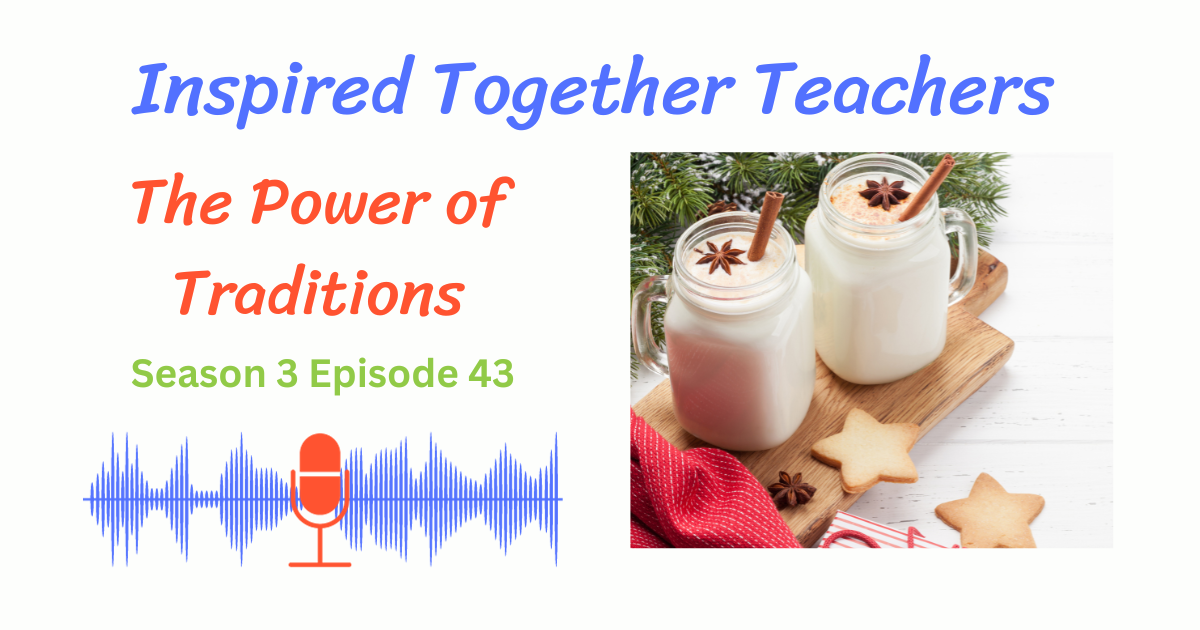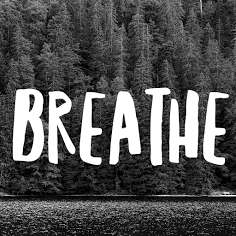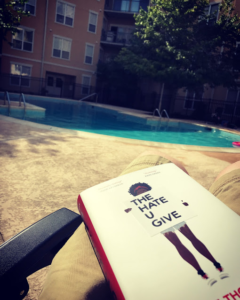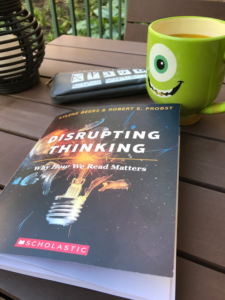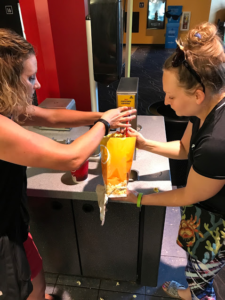The Power of Traditions S. 3 E. 43
Listen to this episode to explore the ways in which traditions shape our lives.
Show notes:
Episode Summary:
This is the time of year when we are all involved in planning for and carrying out traditions. What are your traditions? Do you follow traditions from your childhood or have you changed them or even gotten rid of them? Why do we even have traditions and is there still value in them? Today, we’re talking about traditions and how they affect or personal life and our life at school.
In this episode:
Note: As always, this is just a summary of the actual podcast. Please listen to the podcast for all of the examples and stories that we share.
Season’s greetings! If you’re listening to this podcast on or near the date this episode drops, we are in the midst of the holidays. We were talking about the traditions we celebrate and we decided it would be a great topic to discuss on the podcast!
So, what is the big deal with traditions? Why do we continue to follow them year after year, sometimes for a life time and sometimes for hundreds and maybe even thousands of years? Should we even bother with traditions?
And what about school traditions? What purpose do they serve? How could use traditions to strengthen your school or classroom community?
Why do we have and need traditions?
Traditions help connect one generation to another.
A common tradition is passing down beloved family recipes such as Grandma’s sugar cookies, family foods and other recipes. Food and traditions around food are often deeply ingrained in us. Passing them down through generations helps those who use the recipes or eat the foods to become connected to those who have gone on before.
Holiday parties are another tradition that bring generations together which allows the younger members of the family to spend time with grandparents or great grandparents. Holidays bring their own traditions of gifts, music, and activities that are carried down from family to family for generations.
Another example of a tradition that helps connect different groups involves student writing. One fifth grade teacher has her students write stories and memories of their year. They then turn their writing into a book and each students gets a copy. Students also write a book of letters for the next year’s students. These are full of fun stories, things to look out for, and generally give advice to students for how to be successful in the class next year. This is a fun tradition and the books are hysterical!
Traditions help teach us about our history.
Religious traditions often help people to understand and learn their religion. For example putting up a creche or nativity set, or lighting Hanukkah menorah or Kwanza Kinara often starts a conversation about the meaning of the tradition.
Another example is Armistice Day, or Remembrance Day on Nov. 11th which celebrates the end of the first World War. It is a big deal in France, where the entire country shuts down and people visit cemeteries to honor their families. It also occurs in other countries including the United States. People wear small paper poppies on their lapels, a reminder of all of those who died during the war. When young people ask about the poppies, they learn about the history of the war and how it devastated a generation of young people, particularly young soldiers.
In Paula’s family there is a baptismal dress which has been worn by over 100 people. It was made by her great-great-great grandmother in the early to mid -1800s. It has been worn by her relatives, including herself and her children, since that time. The dress helps her family members connect to others in their family tree.
Traditions keep cultures alive.
Whether or not we know it, many of our traditions came from our families’ long history and cultural ways of living. This includes foods eaten in different parts of the world, the music of a culture, and the arts.
Recently friends of ours celebrated their wedding on Dia De Los Muertos, or Day of the Dead, a tradition day of celebration in Mexican cultures. It is a day to honor beloved relatives who have died. The wedding celebration included traditional marigolds and other beautiful, brightly colored flowers, painted faces and an offering of favorite foods and beverages surrounded by photos of departed family members. Far from a somber or scary occasion, it was the unity of two people as a new family while honoring and respecting those who have passed on.
We were fortunate enough to be able to visit a school in Ecuador which was called an indigenous school. In addition to modern learning activities, the school was intentional about keeping cultures of the families alive. There were days where students wore their tribal dress and did their tribal dances. They learned about ancient herbs that were used for medicinal purposes, and grew a garden of foods that had been grown in their mountain homelands. Even in the center of a multicultural city of over a million people, they celebrated their culture as an important part of their heritage. These teachers and families are being proactive in remembering their culture, and hopefully the children will not forget their background and traditions.
Traditions reinforce values.
When Paula’s young daughter learned that firemen had to work on Christmas, she felt bad for them. The family decided to make cookies and deliver them to the fire station on Christmas Eve. It was a way of honoring the people who do the work so we can spend time with our families. It is a great example of how traditions reinforce our values.
Schools often have canned good collections around the holidays. Kids bring in cans of food, which teaches them to be thoughtful about the needs of others. It reinforces the value of kindness.
A school where Michele taught held track and field days at the end of the school year. Each team had one kindergartener, one first grader, etc. The older kids took care of the younger ones and helped them to do well in the events. The emphasis was on life skills such as working together, playing fairly, and trying without giving up. The awards included typical event winners, but also included things like working together, kindness, following the rules, being encouraging etc. It was a great way to teach and reinforce values in a really fun way.
Traditions give us something to look forward to.
Think of the anticipation before a holiday or yearly event, you get to think about and plan for and get excited about something that is coming. We count down the days and look forward to the events. We all need that.
At school, students often look forward to traditions such as Homecoming activities. It adds some fun and can really bring energy to a school. Schools encourage crazy hats, skits, and other engaging activities. These things help students to see school as someplace that is fun, and it is a place they want to be. Wouldn’t we be better off if all students loved school and looked forward to it?
Traditions help people to create memories.
Think about those times when you get the camera out, when you gather people and talk and eat, and laugh and sing. Think of the times you most remember, and weddings, birthdays and holidays will likely be well represented.
Paula’s family creates gingerbread houses, and each year they pull up pictures from all the previous 15 years before beginning this year’s house.
Think of school traditions such as concerts, sporting events, musicals, plays, prom, and graduation. All of these traditions create memories, many which we carry with us throughout our lives. We both have memories from elementary school concerts. It was such fun to go back to school at night. We were all dressed up and loved seeing all the families and our teachers in the gym. It was special and magical.
Another example is in our family Christmas ornaments. We both get ornaments for our children each year. We try to choose something that represents their interests or special events that year. It is a fun way to save memories and fun to open up the ornaments each year and remember the times and places that inspired them.
Traditions offer us a chance to pause and reflect on life, and to recognize what is important.
We don’t always take time to slow down and reflect on our lives. Celebrations and traditions often help us to do that. For example, when you attend a wedding, you likely reflect back on your own wedding. Or when you put up the Christmas tree and see all the family ornaments and remember the stories behind the events through the years or the places you traveled. It will remind you of what is important.
Events like these offer us a moment to slow down, relax, and think.
In school, yearbooks often serve as a reflection tool, as do end of year celebrations or class parties. Those things allow you to look back on the year and remember the things that happened.
Graduations mark an end of one chapter and the beginning another. The speakers’ messages can usually relate to any transition and remind us of the things that matter in our lives. Though the speaker may be talking to the graduates, others also have a chance to pause and reflect.
Traditions can be reconsidered.
Some people balk at traditions or find them old and stuffy. Sometimes traditions seem forced on you and you no longer want to uphold them. You are allowed to rethink traditions. Some need to be adapted, some may need to be dropped completely, and others are worth keeping.
Michele’s family had a apricot Jello salad that had been included in the holiday meals for many years. After several years of dumping the Jello down the drain after no one ate it, she realized that it was time to reconsider. The apricot Jello era ended, though other items on the menu such as turkey and dressing stayed.
In Paula’s family, they can no longer use the baptismal dress. It has become too worn and threadbare. Now they need to rethink the tradition. After years of celebrating Christmas with her cousins, now that they all have their own families, they plan summer get togethers at a park instead. The tradition of getting together is still there, but it has changed.
We’ve both kept the tradition of giving Christmas gifts, but rather than many little gifts, we got growing up, we now give their children a family experience or trip.
Some traditions deserve to be eliminated. One example is hazing. Hazing used to be tolerated and accepted. Today, hazing is a tradition that is no longer acceptable. The Northwestern football coach was recently fired for allowing hazing. Similarly, schools with potentially hurtful team or mascot names have changed their name to something related but less offensive.
Sometimes it is time for a tradition to end.
Some traditions deserve to stick around.
We have traditions that serve us well and that we hope to continue. Paula plans to continue the ornaments, hopefully with her grandchildren someday. Michele plans to host her entire extended family for Christmas as long as she is able.
Whether we adapt them, get rid of them, or keep them, traditions serve a purpose.
According to Nicola Watts,
“In our fast paced and ever-changing lives and a world that appears to be in constant turmoil, traditions are more important than ever before. They offer constancy, stability, familiarity and a semblance of order and predictability to our existence. They comfort us, give us a sense of belonging, and make us feel safe and secure.”
Recap:
Traditions serve many purposes in our lives. They help connect us to other people, help us to remember who we are and where we came from, and help us to pass down and reinforce values. Traditions are fun and create time and space for togetherness and building memories.
Quote:
“In our fast paced and ever-changing lives and a world that appears to be in constant turmoil, traditions are more important than ever before. They offer constancy, stability, familiarity and a semblance of order and predictability to our existence. They comfort us, give us a sense of belonging, and make us feel safe and secure.”
Nicola Watts
Connect with the Inspired Together Teachers Community:
Download our FREE resource: The Inspired Teachers Guide to Taking Back Your Life.
Website: https:www.inspiredtogetherteachers.com
Instagram: Inspired-Together-Teachers
Facebook: Inspired Together Teachers
Facebook Teacher Warriors Group: Teacher Warriors Facebook Group
Linked In: Inspired Together Teachers
More About Inspired Together Teachers:
Are you a teacher struggling to balance your best work with your best life?
If you are dedicated and caring but often overwhelmed and exhausted, join us at Inspired Together Teachers. We’ll give you inspiration, strategies and tips that help you navigate life’s challenges as a stronger, more confident, and more joy filled person, both in and out of the classroom.
Inspired Together Teachers will give you practical tools to experience more of what matters most in your life.
Co-hosts Paula Schmidt and Michele Vosberg are award winning educators with the experience and skills to help teachers thrive in life and work. They’ve taught at all levels, worked with thousands of teachers, and conducted workshops around the world. They are also the authors of the #1 best-selling book The Inspired Teachers Journal: A Weekly Guide to Becoming Your Best Self.
Paula and Michele would love to have you to join them on their quest to lived inspired lives.

